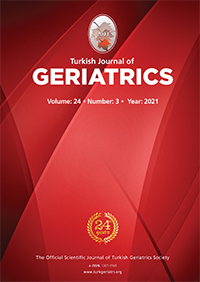2University of Health Sciences, Diyarbakir Gazi Yasargil Education and Research Hospital, Neurology, DÄ°YARBAKIR, Turkey DOI : 10.31086/tjgeri.2021.239 Introduction: Managing head traumas are quite different in the geriatric population than in other age groups due to patient comorbidities, decreased cerebral compliance, and antithrombotic use. The aim of this study was to examine head injuries in geriatric patients and investigate the effectiveness of the Rotterdam CT score in diagnosing and treating patients at the time of admission to facilitate head trauma management.
Methods: Demographic, clinical, and radiological data from head trauma cases in geriatric patients, along with each patient"s latest status, if our clinic followed up with them, were studied retrospectively.
Results: The mean admission Glasgow Coma Scale score was 12.89±3.134. Patients who had experienced a fall had a higher mean age (p=.004), while patients who had fallen from a height had a lower Glasgow Coma Scale score at the time of admission (p=.000) but higher mortality (p=.018). Patients had a mean Rotterdam CT score of 1.514 ± 1.153 at the time of admission. Mean Rotterdam CT scores were higher in patients who were hospitalized in the intensive care unit (p=.000), had a history of falling from a height (p=.000), and required surgery in the acute period (p=.005). Patients with comorbidity had longer hospitalization times (p=.042), while patients with high Rotterdam CT scores had low modified Glasgow outcome scores (p=.000).
Conclusion: We determined that the need for rehabilitation and long-term care and the possibility of mortality increase after head traumas in the geriatric population and Rotterdam CT score were a good indicator of the clinical situation and final status.
Keywords : Craniocerebral Trauma; Glasgow Outcome Scale; Brain Injuries, Traumatic
